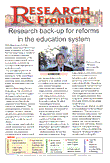 |
better quality education

From last year, all Hong Kong public schools began weaning themselves from a central management system towards greater autonomy and self-determination.
The first stage of the two-year HKIEd project, headed by Prof Yin-cheong Cheng, established that school-based management may bring significant improvements in education quality and effectiveness. Findings support that:
> School performance is enhanced in terms of responsiveness to change, pro-activeness to future challenges, and readiness to adapt to a rapidly changing environment.
> Team spirit and esprit de corps is improved.
> Work attitudes of teachers are improved in ways such as their perceived meaningfulness of work, their work commitment, and self-learning capacity.
The second stage of the project is looking at how effective school-based management can be developed and implemented at the school, group and individual teacher levels. Prof Cheng said: "A centralised administration is fine when you are trying to provide for numbers. That's not a problem in Hong Kong now. Our challenge is to enhance education quality, to meet individual student needs, and also the needs of individual schools."
Among areas receiving research attention is how far empowerment should go. Prof Cheng said: "We are recommending that it should go further than principals and school sponsoring bodies, that it should include teacher groups, and individual teachers too. We feel this is an important finding."
Completion of the HKIEd research is scheduled for the middle of this year with a final report to be published by mid 2002. The research is helping to provide insights for the government's policy framework, and is helping in the system's implementation.
"By decentralising power, we let individual schools decide how best to use resources; they can make faster decisions than under a centralised system and use the resources more effectively." With decentralisation comes new responsibilities for teachers. They need to assess their local area's constantly changing educational needs and diversity of student quality, analyse their own strengths in teaching and the community, and then form a pro-active strategy to match educational needs with their teaching potential, said Prof Cheng.
He added: "The role of the teaching is becoming more complex. Previously, teachers just focused on teaching. Now they have to think about the changing environment, the changing classroom, strategic planning of the school, the development plan of subject groups. "Teachers need a wider spectrum of professional skill and competencies. The mindset and line of thinking may need to change, and the school culture must change at the same time to become more of a learning organisation."
Principal Investigator > Prof
Yin-cheong Cheng > Email > yccheng@ied.edu.hk